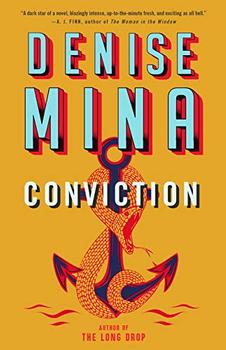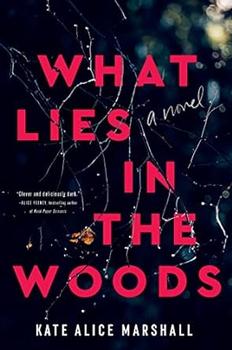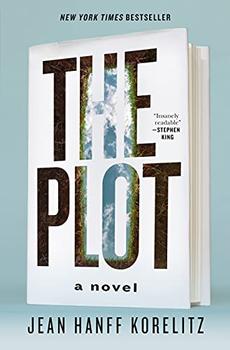Summary | Excerpt | Reviews | Beyond the book | Read-Alikes | Genres & Themes | Author Bio

Scottish author Denise Mina's latest novel, Conviction, is a fast-paced thriller narrated by Anna, a smart and sassy podcast addict with a mysterious past. While listening to a true-crime story she realizes that she knows its subject, Leon Parker (thought to have murdered his two children and committed suicide). The podcasts initially serve as a distraction from her failing marriage until a coincidence accidentally shines a light on her life and forces her to flee her home. She continues to listen to the episodes while on the run, and the more deeply immersed she becomes in subsequent broadcasts, the more convinced she is that those hunting for her are the same people that killed Parker and his family. She determines that she needs to track down the true killer to protect herself and her two daughters from becoming victims themselves.
Inserting the text of fictional podcasts throughout the novel to drive the plot puts a clever twist on a well-explored genre. The episodic nature of the medium works well in this context; a chapter of the novel may contain the text of a single broadcast, simultaneously revealing new information to both the book's heroine and its readers, ramping up the tension and setting a direction for Anna's next move.
The most appealing aspect of the novel, though, is its protagonist; she's an absolutely intriguing character. Readers learn in the first pages that Anna's whole life, including her identity, is based on lies.
Just tell the truth. I've said that to my own kids. What a ridiculous thing to teach children. No one wants to hear it. There has to be a reason to tell the truth. I stopped some time ago, and let me tell you, it was great. Best decision I ever made. Lie and lie again, make up a name, a background, your likes and dislikes, just fabricate the whole thing. So much more rational. But I'm telling you the truth in this book. There's a very good reason for that.
Although the book is ostensibly about solving the murders, most of the plot revolves around Anna gradually revealing why she's running from her past and how her history connects her to the crime - a more compelling thread than her investigation of the killings. The narration, too, is a highlight, with Anna's wry sense of humor evident throughout. As she enlists the help of a friend, she records this exchange:
"There's no evidence anyone is after us, Anna, a lot has happened to you, I'm not saying it hasn't, but maybe you're also just a bit paranoid?" I didn't know what to say to that. I am paranoid but men have tried to kill me and that does tend to make you paranoid.
There were a few stylistic elements that did detract from my overall enjoyment. The author often has Anna drop a reference to her past out of nowhere, with no connection to what readers have already been told. Several times I had a "Wait… what?" reaction, and I had to back up to see if I'd missed something. Also, almost every chapter ends with an ominous one- or two-sentence cliffhanger; for example, a chapter about Anna's daily routine on a "mundane suburban Monday" concludes with the sentence, "I should have stayed under the sea with the ghosts." Coupled with the very short chapters I felt the technique was a blatant attempt to artificially create a page-turner, and it got old after a while. Lastly, many parts of the plot required a suspension of disbelief, almost-but-not-quite to the point where I found the whole thing too incredible. The protagonist's narration was captivating, however, and in the end that's what kept me engaged.
I found Conviction to be a light, entertaining read that would likely appeal to fans of thrillers, particularly those who prefer strong, interesting female protagonists.
![]() This review was originally published in The BookBrowse Review in July 2019, and has been updated for the
May 2020 edition.
Click here to go to this issue.
This review was originally published in The BookBrowse Review in July 2019, and has been updated for the
May 2020 edition.
Click here to go to this issue.

If you liked Conviction, try these:

by Kate Alice Marshall
Published 2024
Kate Alice Marshall's What Lies in the Woods is a thrilling novel about friendship, secrets, betrayal, and lies - and having the courage to face the past.

by Jean Hanff Korelitz
Published 2022
Hailed as "breathtakingly suspenseful," Jean Hanff Korelitz's The Plot is a propulsive read about a story too good not to steal, and the writer who steals it.
Your guide toexceptional books
BookBrowse seeks out and recommends the best in contemporary fiction and nonfiction—books that not only engage and entertain but also deepen our understanding of ourselves and the world around us.